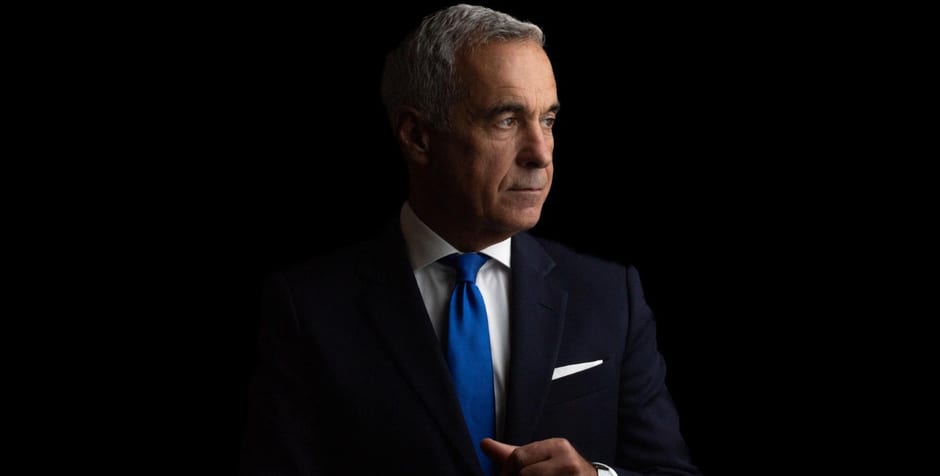
Grégor Puppinck, director of the ECLJ, was invited to appear on Tocsin on Monday, April 28, to discuss the Romanian presidential elections and the political and legal turmoil surrounding the vote. The full program can be heard above, and below is a comprehensive timeline of events since the first round of the presidential election to date.
November 24, 2024: Călin Georgescu comes out on top in the first round of the presidential elections with 23% of the vote, ahead of Elena Lasconi, leader of the centrists (19%). George Simion obtains 14% of the vote.
Surprised by the strong vote in support of Mr. Georgescu, the Romanian Constitutional Court orders a recount of the votes (date unknown).
December 1, 2024: Legislative elections. In the absence of a clear majority, a pro-European coalition is formed, bringing together the PSD, the PNL, the UDMR, and the USR.
December 23, 2024: Romanian President Klaus Iohannis reappoints 57-year-old Social Democrat Marcel Ciolacu as head of a crisis government. He has been prime minister since June 2023.
December 2, 2024: After a recount, Romania's Constitutional Court validates the results of the first round of the presidential election, paving the way for a runoff on December 8 between Călin Georgescu and Elena Lasconi. Călin Georgescu is leading in the polls.
The Supreme Council for National Defense (CSAT) identifies “25,000 TikTok accounts” directly associated with Mr. Georgescu's campaign, which became “extremely active two weeks before the election date,” and suspects Russian interference (date unknown).
December 6, 2024: Based on the CSAT report, the Constitutional Court annuls the results of the first round (ruling no. 32/2024) of the elections due to alleged “foreign interference” and undeclared election funding.
It should be noted that the 9 judges of the Constitutional Court are appointed for 9 years, 3 by the President of Romania, 3 by the Chamber of Deputies and 3 by the Senate. The Social Democratic Party (PSD) and the National Liberal Party (PNL) held an absolute majority in both houses of parliament.
The pro-European Romanian head of state, Klaus Iohannis, said in a solemn address: “I will remain in office until a new president is elected,” adding, with a nod to “investors, the EU, and NATO,” that Romania remained “a stable and strong country.”
December 17, 2024: The European Commission announces the opening of an investigation into election manipulation via TikTok.
Thousands of Romanians protest daily against the cancellation of the elections.
December 20, 2024: An independent investigation reveals that the National Agency for Fiscal Administration (ANAF) has evidence that the ruling National Liberal Party financed the TikTok campaign, paying nearly €300,000 through a UK-based communications agency. The National Liberal Party's goal was to increase votes for Călin Georgescu in order to divide the far right and thus increase his chances of reaching the second round. See also here.
January 9, 2025: Former European Commissioner Thierry Breton said of the election cancellation: “We did it in Romania, we will obviously do it in Germany should it be necessary.”
January 27: The European Commission for Democracy through Law, known as the Venice Commission, published an ”Urgent Report on the annulment of election results by constitutional courts.”
February 5: The French Minister Delegate for European Affairs, Benjamin Haddad, on a visit to Bucharest, meets with Foreign Minister Emil Hurezeanu, among others.
February 12: President Klaus Iohannis resigns after more than ten years in power, facing impeachment proceedings initiated by opposition parties following the annulment of the 2024 presidential election. Since his resignation, Ilie Bolojan, President of the Senate and member of the National Liberal Party (PNL), has been acting as interim president.
February 14: At the Munich Security Conference, US Vice President J. D. Vance denounced the cancellation of the elections as an attack on democratic principles, saying that the Romanian authorities had acted on the basis of “flimsy suspicions from an intelligence agency and enormous pressure from its continental neighbors.”
February 20: Elon Musk calls the president of Romania's Constitutional Court, Marian Enache, a “tyrant.”
February 26: Câlin Georgescu is arrested and charged with six offenses, including making false statements about his 2024 campaign expenses, condoning war crimes and genocide, and initiating a fascist organization. He is placed under judicial supervision: he is banned from using social media, appearing in the media, leaving the country, and carrying a weapon for the duration of the investigation.
Câlin Georgescu once again announces his candidacy for the new presidential elections, after gathering the necessary signatures.
March 5: The French ambassador to Romania reportedly met with the president of the Romanian Constitutional Court to influence the decision and remove Georgescu from the race (unofficial sources).
March 6: The European Court of Human Rights (ECHR) rejected Călin Georgescu's application as inadmissible, ruling that the right to free elections does not apply to presidential elections. This decision followed a previous request for interim measures filed by Mr. Georgescu on December 16, 2024, seeking to suspend the annulment of the 2024 Romanian presidential election. The ECHR rejected this request on January 21, 2025, considering that it did not fall within the scope of Article 39 of its Rules of Procedure.
March 9: Romania's Central Electoral Commission rejects Câlin Georgescu's candidacy in the new election, based on the Constitutional Court's decision of December 6, 2024.
March 11: Romania's Constitutional Court upholds the Central Electoral Commission's decision to exclude Călin Georgescu from the presidential race.
March 15: Candidate Diana Sosoaca is prevented from running.
More than 200 individual appeals have been filed in recent months, according to the Romanian Constitutional Court. In a statement, it insisted on the need to “urgently restore order” in the face of those trying to cause chaos.
All but one are rejected.
April 24: The Ploiești Court of Appeal, represented by Judge Alexandru Vasile, decides to overturn the Constitutional Court's decision to cancel the first round of elections.
Justice Minister Radu Marinescu told Agence France-Presse that “this is an absolutely unacceptable situation,” referring to apparent “coordinated judicial assaults” aimed at “discrediting” the judicial system for “political purposes.”
The prosecutor's office appealed the same day, before the grounds for the ruling were published.
Judge Alexandru Vasile of the Ploiești Court of Appeal is immediately subject to a disciplinary investigation initiated by the Superior Council of Magistracy (CSM), which refers the matter to the Judicial Inspection to examine whether the judge committed a disciplinary offense in issuing a controversial decision on April 24, 2025.
April 25: The Court of Cassation overturned the Court of Appeal's decision.
“Constitutional Court Decision No. 32/2024 is a judicial act, adopted in the exercise of its own exclusive jurisdiction provided for in Article 146, paragraph f, of the Constitution. The judicial acts of the Constitutional Court are not administrative acts and, therefore, they cannot be challenged in administrative proceedings, annulled or suspended. Thus, all the constitutional and legal effects of judgment No. 32/2024 [...] are part of the constitutional order,”
Sunday, May 4 and 18: Two rounds of new presidential elections are scheduled.
Câlin Georgescu has thrown his support behind George Simion, president of the Alliance for the Unity of Romanians, against Crin Antonescu, candidate of the pro-European coalition in power (PSD, PNL, UDMR), Victor Ponta, and Elena Lasconi, among others.













